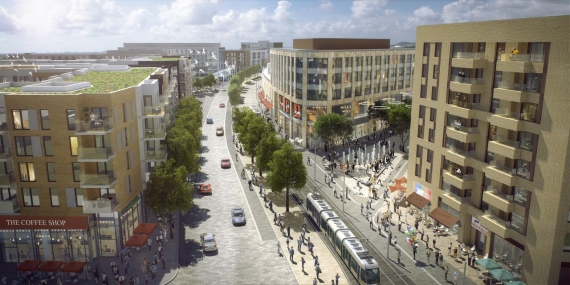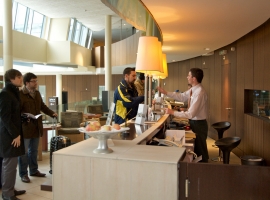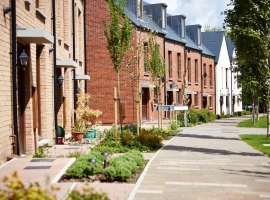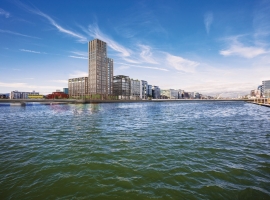
Office space was the most active sector in the Irish property investment market in 2020 at 39% of total turnover, according to new figures released today by Lisney, Ireland’s largest independently-owned multi-disciplinary property advisory company.
That said, the Private Rented Sector also registered a very strong performance in 2020 with €1.2bn in turnover, equating to 38% of all investment spend and all of which was in Dublin. The larger schemes generally comprised forward purchases with 60% of all deals done off-market, a trend that is expected to continue in the medium-term. With several billion, consisting of a mix of domestic and overseas money, now chasing PRS opportunities, this sector is set to continue performing well.
International travel restrictions did have an impact on overseas investors seeking opportunities in 2020, and Lisney say this will continue to for at least the first three months of this year, if not the first six. That said, 80% of turnover related to international investors in 2020 as many of the Irish institutions were absent from the market following closure of their open-ended funds earlier in the year.
In other sectors, Lisney reports that Industrial property was the most resilient sector of the commercial property market, with domestic and international demand in the sector very strong. While ‘the future of the office’ remains a hot topic of debate, Lisney say the vaccine roll-out should see a partial return to pre-Covid occupancy rates – although ‘the office’ will evolve, the social and collaboration aspect cannot be underestimated.
The office market had been earmarked to have another good year in 2020 and with strong demand, it started well with almost 90,000 sqm of accommodation transacted in the first quarter. This included some very large deals in the tech and financial sectors. However, the effects of COVID-19 took their toll, and with only about 52,000 sqm of transactions completed in the remaining nine months of the year, the market was in somewhat of a hibernation.
One of the biggest talking points in the sector was, and continues to be, the future of the ‘the office’. Flexibility was already creeping into the working week prior to the pandemic, but it has now been accelerated.
Whatever the path chosen by businesses, Lisney say it seems likely that some staff in certain sectors will work remotely one to two days a week. On the surface, this might imply that 20% to 30% less space will be required by businesses as hotdesking on days in the office becomes the norm.
However, Lisney say there is a possible counter to this reduction and people have become accustomed to greater personal space in the last nine months and in open plan offices, desk space sizes and distances from colleagues may grow due to personal preferences. Lisney anticipate continued demand in 2021 as there are already some notable requirements in the market.
Big tech companies is expected to continue to power market demand. Lisney say the roll-out of the Covid 10 vaccine should see a return to busier office occupancy rates - however, it will be towards the end of the year and into 2022 before activity reverts to healthier levels.
Furthermore, Lisney say Brexit will remain a feature of the market this year and it will be prudent for UK companies who supply to Ireland to hold extra stock and there will be additional space requirements to ensure supply chains are not disrupted, including bonded warehouses.
Within operational PRS schemes, rent collection has remained strong with delinquency rates at about 3% to 5%. Renter demand also remained solid and rental levels in PRS schemes have been generally stable since the beginning of the pandemic, albeit with some slight falls towards the end of the year.
Lisney say Tenant’s rental affordability will remain in focus this year, and the divergence between new bespoke schemes and older ones will widen; those with high-quality facilities and amenities within the development will do better.
With COVID-19 accelerating a change in lifestyle of many, Lisney expect tenant requirements will evolve further. In the latter part of 2020, Lisney already started to see a focus on apartment sizes with many requiring an additional room to use as an office when working from home.
Speaking this week, Lisney Managing Director, David Byrne said, "Resilience is a word that in my view best describes the property market in 2020. At the end of 2020 we finally saw a Brexit trade deal agreed at the 11th hour, and whilst the devil will be in the detail, we now ultimately know what we are dealing with."
He added, "As we begin 2021 regrettably, we are in the midst of a third and seemingly more severe wave of this pandemic with case numbers rising exponentially. The key difference is that we know a vaccine is in place; the speed of rollout of which will be vital. Whilst the early part of 2021 will continue to see a degree of uncertainty prevail, it does feel as if a supressed optimism brims under surface knowing that a hopeful end to this pandemic is in sight."
Source: www.businessworld.ie

















